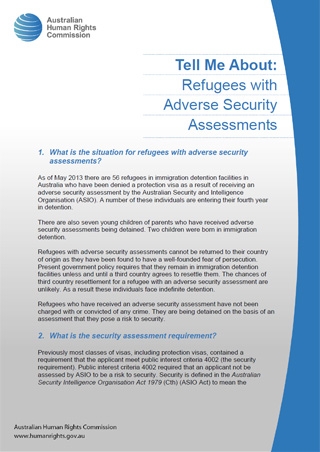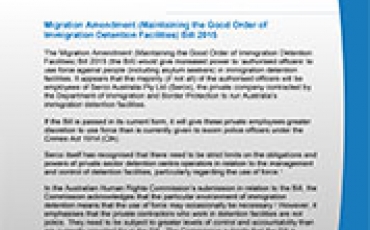Tell Me About: Refugees with Adverse Security Assessments

1. What is the situation for refugees with adverse security assessments?
As of May 2013 there are 56 refugees in immigration detention facilities in Australia who have been denied a protection visa as a result of receiving an adverse security assessment by the Australian Security and Intelligence Organisation (ASIO). A number of these individuals are entering their fourth year in detention.
There are also seven young children of parents who have received adverse security assessments being detained. Two children were born in immigration detention.
Refugees with adverse security assessments cannot be returned to their country of origin as they have been found to have a well-founded fear of persecution. Present government policy requires that they remain in immigration detention facilities unless and until a third country agrees to resettle them. The chances of third country resettlement for a refugee with an adverse security assessment are unlikely. As a result these individuals face indefinite detention. Refugees who have received an adverse security assessment have not been charged with or convicted of any crime. They are being detained on the basis of an assessment that they pose a risk to security.
2. What is the security assessment requirement?
Previously most classes of visas, including protection visas, contained a requirement that the applicant meet public interest criteria 4002 (the security requirement). Public interest criteria 4002 required that an applicant not be assessed by ASIO to be a risk to security. Security is defined in the Australian Security Intelligence Organisation Act 1979 (Cth) (ASIO Act) to mean the protection of Australia from activities such as espionage, politically motivated violence, the promotion of communal violence and acts of foreign interference.[1]
In October 2012 the High Court of Australia in Plaintiff M47/2012 v Director General of Security & Ors[2] held that the security requirement was invalid on the basis that it was inconsistent with the provisions of the Migration Act 1958 (Cth). The Government has not yet announced a response to the High Court’s decision.
3. Are refugees provided with reasons for their adverse security assessment?
Under the ASIO Act a person who is the subject of an adverse security assessment is ordinarily provided with a statement that sets out information that ASIO has relied upon to make the determination.[3] However, refugees in immigration detention who have received an adverse security assessment are not provided with this type of statement. This is because the requirement to do so under the ASIO Act does not extend to a person who is not an Australian citizen or a holder of a permanent visa or special purpose visa. [4]
4. Can refugees seek review of an adverse security assessment?
Refugees have limited opportunities to seek review of an adverse security assessment.
While the Security Appeals Division of the Administrative Appeals Tribunal (AAT) has the power to review adverse security assessments, access to the AAT is denied to people who are not Australian citizens or holders of a permanent visa or a special purpose visa.[5] Accordingly, refugees with adverse security assessments cannot access merits review in the AAT.
Further, although the High Court of Australia has held that ASIO decisions are subject to judicial review, the ability of ASIO to withhold from an applicant and the court the information on which it has relied means that challenging that information is virtually impossible.
On 16 October 2012 the Australian Government announced an independent review process for refugees who have been refused a permanent visa as a result of an adverse security assessment by ASIO. The Government appointed the Hon. Margaret Stone as the Independent Reviewer for Adverse Security Assessments.
The Independent Reviewer is required to examine all the material relied upon by ASIO in making the security assessment and to provide an opinion to the Director-General of Security on whether the assessment is an appropriate outcome based on the material ASIO relied upon. The Independent Reviewer will then make recommendations to the Director-General of Security.
Under this review process ASIO is required to provide an unclassified written summary of reasons for the decision to issue an adverse security assessment to the Independent Reviewer on the basis that it can be provided to the refugee.
5. What are the Commission’s concerns?
Transparency of the ASIO security assessment process
The Commission is concerned about the lack of transparency of the ASIO security assessment process. Under the new Independent Reviewer process refugees are provided with an unclassified written summary of reasons for the decision to issue an adverse security assessment. However, there is limited information available about the content of the summaries of reasons. In particular, it is unclear whether they will set out any details about the information that ASIO relied upon to make the adverse assessment.
The Commission is concerned that a failure to provide sufficient details about the information relied upon by ASIO could amount to a lack of procedural fairness and could prevent a blatant error, such as an error of identification, being identified. Furthermore, it may lead to a breach of article 9(2) of the International Covenant on Civil and Political Rights (ICCPR), which requires a person who is arrested to be provided with reasons for their arrest.[6]
Review of adverse security assessments
The Commission is concerned that refugees have limited avenues to seek review of an adverse security assessment. Refugees who receive an adverse security assessment may face indefinite detention, potential removal from Australia, and separation from family members. Any review mechanism must adequately reflect the seriousness of these consequences.
The Commission has welcomed the Australian Government’s appointment of an Independent Reviewer for Adverse Security Assessments. The appointment is an important acknowledgment of the need for greater transparency and accountability in the application of ASIO security assessments to asylum seekers and refugees. However, a non-statutory review mechanism with non-binding recommendations does not adequately reflect the gravity of the consequences of an adverse security assessment.
In May 2013 the Senate Standing Committee on Legal and Constitutional Affairs recommended that the Australian Government enshrine in stand-alone legislation the role, responsibilities and functions of the Independent Reviewer.[7] The Commission supports this recommendation.
Indefinite detention
Refugees with adverse security assessments and their children remain indefinitely detained in closed immigration detention facilities. Some are detained in high security immigration detention centres such as Villawood IDC; extremely restrictive environments in which to hold people who could be facing a very long period in detention. While others are detained in lower security immigration detention facilities with less restrictive physical environments, they nevertheless remain detained and are not free to come and go.
The Commission is concerned that their detention could amount to arbitrary detention in breach of article 9 of the ICCPR and article 37 of the Convention on the Rights of the Child.
6. What does the Commission recommend?
Enhanced transparency of the ASIO security assessment process
The Commission recommends that refugees be afforded procedural fairness and greater transparency of adverse security assessments by:
- Providing refugees who have received adverse security assessments sufficient information to enable them to understand the information that ASIO relied upon in making the determination.
- Extending access to merits review in the AAT to refugees who are the subject of an adverse security assessment. This recommendation has also been made by the Senate Standing Committee on Legal and Constitutional Affairs[8] and the Joint Select Committee on Australia’s Immigration Detention Network.[9]
- Establishing a role of a Special Advocate to appear in review proceedings where there is a public interest or national security reason to withhold part or all of the adverse security assessment from a refugee.
Durable solutions
The Commission recommends that the Australian Government escalate efforts to find safe third countries for resettlement of refugees who have received adverse security assessments, and explore appropriate residence options in Australia where resettlement within a reasonable time is not possible. The Commission also recommends that the Australian Government inform each individual on a regular basis of the steps taken to secure durable solutions and the prospects of success.
Alternatives to indefinite closed detention
The Commission recommends that the Australian Government consider and utilise alternatives to indefinite detention in closed immigration detention facilities.
Each refugee who has received an adverse security assessment should be individually assessed as to the risk they pose to the Australian community.
That a person has received an adverse security assessment from ASIO for the purposes of a permanent visa does not necessarily mean that they pose such a significant risk to the Australian community to justify indefinite closed detention.
Alternatives to closed immigration detention may include community detention or a bridging visa, if necessary with strict conditions to mitigate any identified risks an individual may pose. For example, conditions might include a requirement to reside at a specified location, curfews, travel restrictions, regular reporting and possibly even electronic monitoring.
In addition to community detention and bridging visas, there is considerable scope for the Australian Government to develop and expand use of other alternatives to holding people in closed detention facilities for indefinite periods. These might include, for example, transforming the use of low security immigration detention facilities into open centres, where individuals have freedom of movement during the day with the imposition of a night time curfew if considered necessary.
7. Useful links
- Australian Human Rights Commission report, Sri Lankan refugees v Commonwealth of Australia (Department of Immigration & Citizenship) (2012)
- Australian Human Rights Commission submission to the Senate Standing Committee on Legal and Constitutional Affairs in its Inquiry into the Migration and Security Legislation Amendment (Review of Security Assessments) Bill 2012
- Senate Standing Committee on Legal and Constitutional Affairs Report on the Migration and Security Legislation Amendment (Review of Security Assessments) Bill 2012
- Australian Human Rights Commission submissions in Plaintiff M47 v Director General of Security & Ors [2012] HCA 46
- Australian Human Rights Commission report, Community Arrangements for Asylum Seekers, Refugees and Stateless Persons (2012)
- Joint Select Committee on Australia’s Immigration Detention Network, Final Report, chapter 6 (2012)
- Australian Human Rights Commission submission to the Independent Review of the Intelligence Community (2011)
- Australian Human Rights Commission submission to the Joint Select Committee on Australia’s Immigration Detention Network (2011)
- Attorney-General Department, Independent Reviewer of Adverse Security Assessments Terms of Reference
- United Nations High Commissioner for Refugees, UNHCR Expert Roundtable on National Security Assessments, Chair’s Summary (2012)
[1] ASIO Act s 4.
[2] [2012] HCA 46.
[3] ASIO Act s 37.
[4] ASIO Act s 36.
[5] Above.
[6] The United Nations Human Rights Committee has interpreted the right to reasons in article 9(2) to apply to any deprivation of liberty. Human Rights Committee, CCPR General Comment No 8: Right to Liberty and Security of Persons (Article 9), 16th session (30 June 1982).
[7] Senate Standing Committee on Legal and Constitutional Affairs, Report on the Migration and Security Legislation Amendment (Review of Security Assessments) Bill 2012, April 2012, p vii, at http://www.aph.gov.au/Parliamentary_Business/Committees/Senate_Committees?url=legcon_ctte/completed_inquiries/2010-13/security_assessments/report/index.htm (viewed 6 May 2013).
[8] Senate Standing Committee on Legal and Constitutional Affairs, above.
[9] Joint Select Committee on Australia’s Immigration Detention Network, Final Report (2012), p 175, at www.aph.gov.au/Parliamentary_Business/Committees/Senate_Committees?url=… (viewed 6 May 2013).


